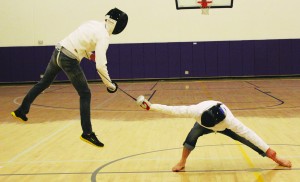Wearing a mask and striking someone with a sword 10 or 15 times would land any modern-day swashbuckler in prison or a role in the remake of “The Princess Bride.” In the world of fencing, however, it is the object of the game, and the California Lutheran University Fencing Club is bringing the sport to campus.
Founded in 2010 by Natasha Boychenko and Hayden Malloch, the Cal Lutheran Fencing Club is offering students and faculty the chance to participate in the Olympic sport of fencing. The club is not inter-collegiate, meaning the team does not go up against other schools and instead pits the club members against one another. Even though the team does not compete, this may change in the future.

Photos by Paulyn Baens – Staff Photographer
“It’s definitely a dream that I have had that before I graduate I could take the team against other schools,” said senior Natasha Boychenko, founder and president of the Fencing Club.
Since the team members only play against other team members, this provides a challenge to the fencers as their opponents gain more time to get accustomed to one another’s fencing styles. This forces the players to perfect their techniques to outwit their opponent and opens up a crucial mental element of fencing, which explains why it is often referred to as “physical chess.”
Fencing can take time to get used to and teammates learn from trial and error, but not without proper training from the long-time members of the team.
“There’s a whole different anatomical structure that you’re getting used to,” Boychenko said. “You’re standing engarde and the positions are weird. You feel strange at first because fencing is a whole different way of movement.”
Even though the sport deals with weapons, there’s little worry in regards to injury. This is mainly because of the protective gear that the fencers wear during a bout.
“There are significantly fewer injuries in fencing than baseball,” said senior Andrew Pineda, treasurer of the club. “That includes pulling muscles, rolling ankles and injuries from the blade as in getting a hard bruise. It’s really a safe sport and we do take our safety seriously.”
The team hosts all varieties of skill sets, ranging from people who had never heard of fencing to people with several years of experience with the sport. For those who are new to the sport, the team leaders make sure to train them in the techniques and standards of fencing to help bring them up to the level of the more experienced players. Most of the time, this is done with great success.
“They’re some of our better fencers now, the people who’ve never fenced before,” Pineda said.
There are no requirements or deadlines that those interested in the club need to meet to join. Open to prospective fencers year-round, the club provides the swords, protective gear, and training to those who need it. All the club asks for a willingness to have fun with the sport.
“The teachers are great,” junior Terah Landy said. “Nobody’s too snappy, they’re all very nice. It’s more about working at your own pace and having fun than being competitive and good at the sport.”
The team offers more than an opportunity to fence. Due to the club only having 15 members, the teammates get to know each other and agree that they’re a close-knit group of friends. Initially, the only thing the team members have in common is a love for fencing. But what the club members see year after year is that mutual admiration growing into something much more.
“I think fencing is an excuse for all of us to get together and hang out,” Pineda said.
Even the newer fencers agree that the club is fodder for friendship.
“My favorite part about fencing is the people that you meet through fencing,” Landy said.
What’s more, the group holds after club meetings at the Centrum on campus. This opens the door for even more bonding.
“We’re definitely a little family on campus,” Boychenko said.
In addition to teammate comradery, members also gain a sense of pride in their sport. Given the sport comes from a different time where chivalry was regarded more highly than it is today, the group encourages members to take part in the values of courtesy, courage and honor on and off the fencing strip.
“Fencing has its roots in that [chivalry] is an ingrained part of the sport,” Boychenko said. “To play well, you have to act well.”
The team members also gain an opportunity for personal growth when they dedicate time to fencing, according to coach Boychenko.
“They’re certainly more confident,” Boychenko said. I don’t want to say that it’s because of fencing—they’re great people on their own—but I would like to say that they have a good foundation that they can always come to [fencing].”
The Fencing Club is always on the hunt for new members and is appreciative of anyone with an interest in fencing joining the club. To join the club, contact Boychenko at nboychen@callutheran.edu or show up to the weekly club meetings on Thursdays at 6:15 p.m. in the basketball court of the Gilbert Sports and Fitness Center.
Christophe Bassett
Staff Writer
Published October 1, 2014
